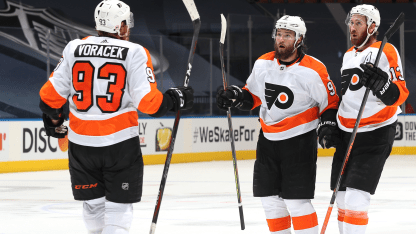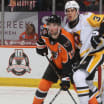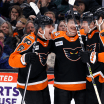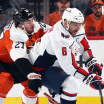1. STABILIZE SHIFTS & MOMENTUM
The Islanders defend well in their own zone and they win a lot of puck battles up ice. New York controlled the puck possession game and created a lot of pressure on the Flyers whenever they touched the puck in two of the three regulation periods of Games 1, 2, and 3.
The Flyers were the better team in one period apiece over the first three games (second period of Game 1, first period of Game 2, first period of Game 3). The Flyers built a quick 3-0 lead in Game 2 and then pulled out a 4-3 victory in overtime.
Game 4 was a bit different. Play at 5-on-5 was even in the first period; the difference was a nearly disastrous penalty kill that saw Brian Elliott forced to make 9 saves, including seven tough ones and five in close to the net, in a two-minute span.
The Flyers, by a wide margin, were the better team in the second period, but the two teams traded off one goal apiece. The third period was back-and-forth, but Islanders goaltender Thomas Greiss came up with a pair of brilliant saves that were followed shortly thereafter by Flyers breakdowns and New York goals.
What have the Flyers done right during the pockets of the series where they've been the better team? In those stretches, the Flyers have been able to string together several positive shifts in a row.
The key, not surprisingly, has been whether the Sean Couturier and Kevin Hayes lines have gotten the better of their shifts. In the long stretches where the Islanders have controlled the play, they've created momentum off unproductive (one and done forays, no clear possession edge) and negative (most of the time spent in the Philadelphia zone) shifts from the Flyers' top two lines. That spills over into extended waves of New York pressure.
No team can simply impose its will for 60 minutes. There will always be little windows of opportunity that arise each period. The team than capitalizes on those moments -- optimally with goals but, short of that, through setting up the next line out to potentially go on the attack -- will hold the momentum.
Something that's been lacking for too much of the periods where the Islanders have carried the play have been stabilizing shifts: a clean exit or two, a little bit of forechecking time even if there are no resulting scoring chances on that particular shift.
2. WHAT NEEDS IMMEDIATE SOLUTIONS IS...
There has understandably and justifiably been a lot of consternation over the Flyers' power play issues during the postseason. Subtract the team's 3-for-7 outburst in a losing cause against Montreal in Game 5 of the first round and the club has but a single power play goal (1-for-37) for the entire postseason to date.
Power plays in general have been sparse in the current series against the Islanders, but the Flyers are 0-for-5 and the Islanders are 2-for-7. Failed PKs proved to be killers in Game 2 (an Anders Lee power play goal started the Isles' comeback from a 3-0 deficit) and Game 3 (a Lee goal off Carter Hart's stick).
In Game 4, it was only Elliott's spectacular nine-saves-in-two-minutes stretch in the first period that prevented a New York power play goal.
Something that was immediately noticeable on the harrowing Islanders' first-period power play in Game 4: the aggressive strong-side puck pressure that the Flyers exhibited most the season was nowhere to be seen. There were shooting and passing lanes galore. That cannot happen in Game 5 if there's to be a Game 6.
3. OUR BEST BEATS THEIR BEST
This has been said over and over again, but only because it's true: It is very hard to win if your team's best players are not the ones leading the way BOTH in process and in results.
The truth of the matter is this: Barzal, Brock Nelson, Lee, Anthony Beauvillier, Josh Bailey and Pageau have all stepped up regularly at critical moments for the Islanders in this series. Only sporadically have the Flyers top players matched or exceeded them. Hayes and Couturier did it in the first period of Game 2, most notably, and the Flyers top players stepped up collectively in OT leading up to Myers' game-winning goal,
It speaks to team's dire situation that the Flyers are 14 games into the postseason with Giroux (5a) and Travis Konecny (4a) still looking for their respective first goals of the playoffs, with James van Riemsdyk pointless and with the same combined goal output from Couturier (two) and Hayes (three) that the team has gotten from rookie Joel Farabee (three) and bottom six forward Tyler Pitlick (two). Jakub Voracek's postseason play has been brilliant in spurts, ineffectual in longer stretches.
Giroux and Konecny both did a much better job in Game 4 of this series than they've done for most of the playoffs in getting to the prime areas where most goals are scored. They each had two prime chances. JVR had one of his own and created a rebound chance for Voracek on another.
Chances, however, are not goals. The Flyers need goals, and they'll probably need their top producers from the regular season to be the ones to deliver enough to win Game 5.
4. NO SELF-INFLICTED WOUNDS
Neutral zone and own-zone turnovers that were NOT the result of heavy pressure but simply haste and carelessness have stepped up to bite the Flyers repeatedly in this series.
Specific to Game 4, Laughton and Myers turned pucks over the defensive zone on the same shift, leading up to the first Islanders goal. That was compounded by all three Flyers forwards (Laughton, JVR and Pitlick) exiting the defensive zone too soon. Goals 2 and 3 for the Islanders saw Niskanen be overaggressive up ice, and getting himself hopeless caught on the wrong side of the puck.
Carter Hart and Elliott have both generally played well. Goaltending could not fairly be described as a main reason for the 3-1 deficit in the series. However, it should be noted that there's been at least one leaky goal against in each game on makeable saves off good scoring chances for New York. In games where there's no margin for error, every makeable save is desperately needed.
At the other end of the ice, Semyon Varlamov was beaten twice by Hayes to the short-side in Game 2. Otherwise, the other five goals -- that's all the Flyers have gotten across four games -- consisted of one goal on the rush off a great individual effort by Couturier and goals where heavy screens/deflections resulted in low-to-high plays producing goals.
5. CONCEDE NOTHING
Two years ago, with a lesser roster than they have now, the Flyers forced a Game 6 against the two-time defending Stanley Cup champion Pittsburgh Penguins. Valtteri Filppula, who'd had a rough series up to that point, turned back the clock for one night to perform like he did at his very best in Detroit, and produced a 3-point game in a 4-2 win in Game 5. Playing through an MCL tear, Sean Couturier scored the game-winning goal.
Ultimately, even with Couturier playing through the knee injury (and scoring a Game 6 hat trick) and Provorov playing through a separated shoulder suffered late in Game 5, the Flyers found themselves going into the third period of Game 6 in a tie game before it slipped away.
In 2016, it took back-to-back-to-back stellar goaltending performances from Michal Neuvirth to turn a 3-0 series deficit into a series where a 1-0 loss in Game 6 prevented the series from going to a Game 7. We all know about the Flyers' historic comeback from a 3-0 series deficit and a 3-0 first period deficit in Game 7 to defeat Boston in the 2010 Eastern Conference Semifinals. In 2014, the Flyers got off the mat after Game 5 to win Game 6 and force a deciding game where the New York Rangers won, 2-1.
That was then and this is now. The common thread to those series, regardless of final outcome, was that the Flyers conceded nothing when they were facing elimination. One way or another, they found a way to stay alive and take the series deep.
The same mentality is needed for Game 5 of this series. It could be a role player unexpectedly having a big game on Tuesday. Hart (or Elliott) will need to give the team a chance to win. The top of the lineup players may need to dramatically reverse the series script to date.
Whatever it is, the Flyers simply need one win -- emphatic or ugly -- to play again on Thursday.



















